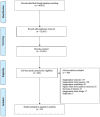Evaluation of Available Cognitive Tools Used to Measure Mild Cognitive Decline: A Scoping Review
- PMID: 34836228
- PMCID: PMC8623828
- DOI: 10.3390/nu13113974
Evaluation of Available Cognitive Tools Used to Measure Mild Cognitive Decline: A Scoping Review
Abstract
Cognitive decline is a broad syndrome ranging from non-pathological/age-associated cognitive decline to pathological dementia. Mild cognitive impairment MCI) is defined as the stage of cognition that falls between normal ageing and dementia. Studies have found that early lifestyle interventions for MCI may delay its pathological progression. Hence, this review aims to determine the most efficient cognitive tools to discriminate mild cognitive decline in its early stages. After a systematic search of five online databases, a total of 52 different cognitive tools were identified. The performance of each tool was assessed by its psychometric properties, administration time and delivery method. The Montreal Cognitive Assessment (MoCA, n = 15), the Mini-Mental State Examination (MMSE, n = 14) and the Clock Drawing Test (CDT, n = 4) were most frequently cited in the literature. The preferable tools with all-round performance are the Six-item Cognitive Impairment Test (6CIT), MoCA (with the cut-offs of ≤24/22/19/15.5), MMSE (with the cut-off of ≤26) and the Hong Kong Brief Cognitive Test (HKBC). In addition, SAGE is recommended for a self-completed survey setting whilst a 4-point CDT is quick and easy to be added into other cognitive assessments. However, most tools were affected by age and education levels. Furthermore, optimal cut-off points need to be cautiously chosen while screening for MCI among different populations.
Keywords: cognition; cognitive decline; cognitive screening tool; dementia; mild cognitive decline; mild cognitive impairment; neuropsychological battery; neuropsychological tests; older adults.
Conflict of interest statement
The authors declare no conflict of interest.
Figures
References
-
- World Health Organization . Dementia: A Public Health Priority. Alzheimer’s Disease International; London, UK: 2012.
-
- Alzheimer’s Disease International . World Alzheimer Report 2019: Attitudes to dementia. WHO; London, UK: 2019.
-
- World Health Organization . Risk Reduction of Cognitive Decline and Dementia: WHO Guidelines. WHO; Geneva, Switzerland: 2019. - PubMed
-
- Mild Cognitive Impairment. [(accessed on 8 October 2020)]. Available online: https://www.dementia.org.au/about-dementia-and-memory-loss/about-dementi....
Publication types
MeSH terms
LinkOut - more resources
Full Text Sources
Medical


